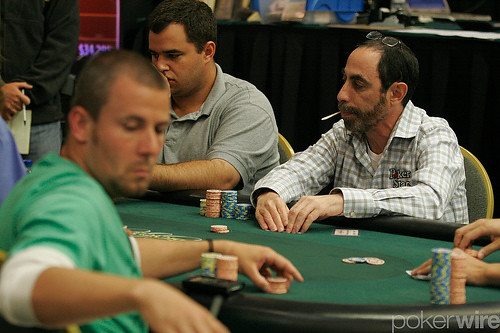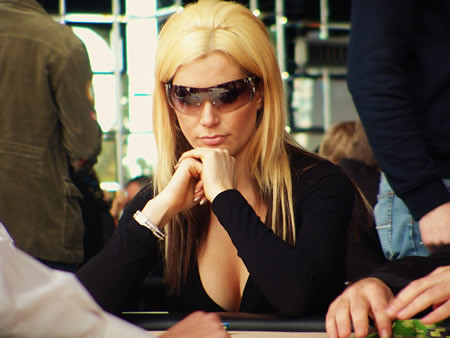In Which We Give You Thinly Veiled Advice About How To Succeed
 Thursday, September 18, 2008 at 4:14PM
Thursday, September 18, 2008 at 4:14PM One of my favorite people in any walk of life is poker player Barry Greenstein. Greenstein made a fortune working for Symantec and quit in 1991 to play poker professionally. He is probably the most winning player in the history of poker, and one of the five best poker players currently playing today. His 2006 classic Ace on the River: An Advanced Poker Guide beats the hell out of poker books by James McManus and A. Alvarez. Barry isn't Tolstoy, but his advice is of interest to poker players and people in all aspects of life. Here now an excerpt from that classic tome, which you can purchase here. - AC

The Game Went On
from An Ace on the River
by Barry Greenstein
I have come to expect to play with some people who are not very likable. Most of them are not my friends, so I don't get upset if they don't act in a civil fashion. It comforts me that I am taking money from flawed people rather than from nice people. Players who are crybabies deserve something to cry about. A successful poker player looks for any flaw in his opponents' personalities and uses it as motivation to beat them out of their money.
Fortunately, it is easy to find flaws. I like to beat up on the bad winners, bad losers, slowrollers, dealer-abusers, chauvinists, racists, egomaniacs, lesson-givers, coffee-housers, loudmouths, etc. The only nice people I want to beat are rich people who will not suffer financially. Poker is entertainment for them, and my poker wins are only a byproduct.

It is important to remember to be quiet if you are winning so you won't irritate those who are losing. The player who wins the pot should let his opponent win the argument. If you have a joke to tell, don't tell it until you are losing and the live ones are winning. I used to play in a game where we found a way to handle the problem of incessant rambling by the winning players. We made it a rule that only losers could talk. It was a very quiet game and was good training for my poker career.
Losers will not get sympathy in a poker room. Since the majority of players lose, they often enjoy and even celebrate the misery of others. It is amazing how many players, looking for sympathy, will show their losing hands and even explain how they made the right laydown, and in so doing, give away their strategy. Apparently it is important for each of them to attract endorsements from others in his quest to be known as the unluckiest player in poker history. Of course, most of these complainers have a very selective memory. When they win a hand they shouldn't have been in, they quickly forget, but when they get beat, they act as if they've been assaulted.

laura prepon
Winning players sometimes have to abide by different rules than losing players. Even in retaliation, a winning player should avoid killing opponents' hands on technicalities, or needling, slowrolling, or otherwise humiliating a losing player.
I rarely show my hand when there is no showdown, even if I have made a nice bluff. An opponent who shows all his bluffs is teaching me how to beat him. I get a line on his play and can be confident I made the right play when I fold and he doesn't show his hand.

laura prepon, bijou philips and danny masterson
Because I often win, I try to keep a low profile so that I am perceived as just another player who suffers the ups and downs that all poker players must endure. Of course I have had bad streaks and suffered losses, so I understand and can commiserate with players who have been losing. However, I don't give them the irrational hope that they can be as successful a gambler as I have been.

barry the hebrew hammer
If I stay off other players' radar screens, I can fool them more often. I don't want to have my style discussed by other players. If I give the impression I have been doing well, it only invites borrowing and staking requests, business propositions and setups by scam artists.
[youtube=http://www.youtube.com/watch?v=1Kjd1ZipWdI]
I try to condition myself to be humble. If an opponent criticizes a play that worked out well, I don't defend myself. Without being facetious, I might say, "Stick around. I'll make worse plays than that." If someone praises me, I remind myself that I have been fortunate. If I brag about how smart I am, how cleverly I played a hand, or how well I have been doing, in the back of my mind I say, "You deserve to lose for being so cocky." Overconfidence can lead to carelessness in decision-making. The poker gods can provide a run of bad cards that will make anyone look foolish.

shannon elizabeth
In the poker society, I try to be polite to people I don't like. If I want to fight with someone, I do it over the poker table by beating him out of his money. Some people are miserable and it's miserable to be around them. Others may be desperate. I don't want to antagonize people who could make me the target of their desperation.

Kim Lansing
I don't usually socialize with my opponents. When I become too friendly with losing players or players with negative-expectation lifestyle, I find it uncomfortable to play hard against them and turn down their requests for money. If I am good friends with another strong winning player, losers in the game will suspect collusion and may avoid playing in games that we both are in.

barry at the table with his son Joe Sebol
It is important to prevent the catalysts in a game from destroying themselves. It's bad business to destroy people. I want the catalysts to do well enough to keep the good game surrounding them going for years. Players often talk about a killer instinct and think all winners have to be heartless. It is isn't true and isn't pragmatic.
I want the losers to feel comfortable. A winning player readily offers condolences to the unlucky card catchers around him.

mike matusow
Example: There was a bookie who made a lot of money booking the sports bets high-stakes players. After a golf outing, the players played some Chinese poker and the bookie joined the game, even though he was a novice. He misplayed almost every hand and was losing badly when he said, "I never get any straights or flushes." He put down his hand with Aces in the back, Kings in the middle, and Jack-Seven-Six in the front. But he had a Jack, a Seven, and a Six for kickers in the back two hands!
Everyone was silent when they saw how badly he had misplayed his hand. They all realized that he would have beaten everybody if he had played Aces in the front hand and two pair in each of the other two hands. (This play is obvious to anyone who is proficient at Chinese poker). The bookie sensed something was wrong and asked Doyle Brunson, "Doyle, do you see any straights or flushes?" While the other were holding their breath and biting their tongues to avoid laughing, Doyle calmly replied, "No I sure don't," and the game went on.
Barry Greenstein is the greatest poker player alive. Buy his book here.
ALSO IN THE DISCUSSION

Daniel Negreanu

Phil Ivey (with Doyle Brunson, the greatest who ever lived)

Erick Lindgren

Tuan Le

Gus Hansen (with David Williams and some fish)
[youtube=http://www.youtube.com/watch?v=i_cze-w4sCA]
THE FIVE BEST POKER BOOKS EVER
5. The Biggest Game in Town, A. Alvarez

4. The Theory of Poker, David Sklansky

3. Positively Fifth Street, James McManus

2. Ace on the River, Barry Greenstein

1. Super System, Doyle Brunson

POKER PLAYING MACHINES

"Rudiments of a Spiritual Life" - The American Dollar (mp3)
"Signaling Through the Flames" - The American Dollar (mp3)
PREVIOUSLY ON THIS RECORDING
I was an architect.
Sometimes I Find Myself In The Ninth Circle of Hell
Workin For The Church While Tyra Banks Diets































Reader Comments (1)
god i love beating you in poker. that one time.